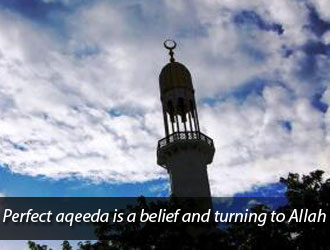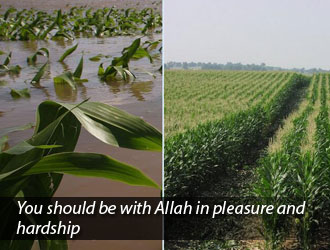- Islamic creed
- /
- Creed from the Quran and Sunnah
Forward:
Dear brother, we are discussing lesson No. 24 of Aqeedah series. The subject matter of our lesson today is about some of the necessary requirements of Aqeedah. They are: Raja' (hoping for something from Allah), Du'a (supplication), Isti'anah (seeking Allah's Help), Tawassol (beseeching Allah) and Tawakkol (trusting in Allah). May Allah help us elaborate on these requirements of Iman, but let me first start with a forward. In fact the science of Aqeedah is not only about what you should believe in, which is one part of this science, but it is also about acting upon that belief. This is the perfect Aqeedah; it is to believe in Allah and act upon His Order, and it is about turning your beliefs into actions. What is your reaction to Tawhid when you understand that Aqeedah is to believe that there is no deity worthy of worship except Allah? Have you ever asked other than Allah for your needs? Have you ever sought the help of other than Allah? Have you ever trust in other than Allah? Have you ever pinned hopes on other than Allah? Have you ever make Raja' to other than Allah? Have you ever feared other than Allah? What is the significance of believing that there is no deity worthy of worship except Allah since this belief is not put into practice? Hence, to have beliefs is one part of Aqeedah, and the complete Aqeedah is to act upon these beliefs.
In fact the science of Aqeedah is not only about what you should believe in, which is one part of this science, but it is also about acting upon that belief. This is the perfect Aqeedah; it is to believe in Allah and act upon His Order, and it is about turning your beliefs into actions. What is your reaction to Tawhid when you understand that Aqeedah is to believe that there is no deity worthy of worship except Allah? Have you ever asked other than Allah for your needs? Have you ever sought the help of other than Allah? Have you ever trust in other than Allah? Have you ever pinned hopes on other than Allah? Have you ever make Raja' to other than Allah? Have you ever feared other than Allah? What is the significance of believing that there is no deity worthy of worship except Allah since this belief is not put into practice? Hence, to have beliefs is one part of Aqeedah, and the complete Aqeedah is to act upon these beliefs. A Satanic Aqeedah:
The best example concerning this point is about the person who believes that a certain skin disease can only be cured if he exposes himself to the sun, but he does not apply this. No matter how much this person talks about the sun and how useful it is in curing that disease, his belief is useless as long he does not expose his skin to the sun. This is what I call a Satanic Aqeedah, because Satan believes in Allah as his Lord, as the Mighty, as the Creator and as the One Who all creatures return to on the Day of Resurrection, but his actions do not conform to this Aqeedah.One should fear but the consequences of his sins, and make Raja' but to his Lord:
Dear brother, we meet many people who trust in other than Allah. They believe that the interference of a certain greater country or a powerful party into their affairs is the solution to their problems, the money it gives puts an end to their poverty and its support make them honored after they have been humiliated. Whoever has such a belief has no Iman. You should put your trust only in Allah. "A slave fears but the consequences of his sins and makes Raja' but to his Lord (to forgive his sins)."The only thing you should fear is the consequences of your sin, and the only One you should put your trust in is your Lord, because everything is in Allah's Hand:
(Allah is the Creator of all things, and He is the Wakil (Trustee, Disposer of affairs, Guardian, etc.) over all things)
All affairs return to Allah:(And to Him return all affairs (for decision))
(He does what He intends (or wills))
Hence, you should not fear anyone but Him.What is the meaning of this Ayah?
This Ayah conveys a very accurate meaning:(And I fear not those whom you associate with Allah in worship)
(And I fear not those whom you associate with Allah in worship. (Nothing can happen to me) except when my Lord (Allah) wills something)
I may and I may not fear those powerful tyrants. I fear them when Allah wills that they do harm to me, but I do not fear them when Allah prevents them from defeating me.
me, but I do not fear them when Allah prevents them from defeating me. Those tyrants look like wild beasts who are controlled by a powerful, wise and just party, so my business is with this party, not those beasts Thus, if this party sets them free and they will catch me, but if it keeps them away from me, I survive:
(So plot against me, all of you, and give me no respite* I put my trust in Allah, my Lord and your Lord! There is not a moving (living) creature but He has grasp of its forelock. Verily, my Lord is on the Straight Path (the truth).)
One of the requirements of knowing Allah:
Dear brother, the traditional understanding of Aqeedah is that you should believe in many things and that is it, so it is not important if your deeds contradict these beliefs. This is absolutely a misunderstanding, and because of it, I intended to make the perfect Aqeedah the subject matter of our lesson. You should make Raja' to Allah Alone, pin hopes on Him Alone, make Allah the Exalted your haven and seek the Hereafter (entering Paradise) by saying whatever word and performing whatever action get you closer to it.Illogical behavior:
Allah says in this very delicate Ayah:(Those whom they call upon [like 'Iesa (Jesus) - son of Maryam (Mary), 'Uzair (Ezra), angel, etc.] desire (for themselves) means of access to their Lord (Allah), as to which of them should be the nearest and they ['Iesa (Jesus), 'Uzair (Ezra), angels, etc.] hope for His Mercy and fear His Torment. Verily, the Torment of your Lord is something to be afraid of!)
The Mushrikoon (polytheists) worshipped idols which stood for deceased righteous people. Interestingly enough, those righteous people used to hope for Allah's Mercy and fear His Torment when they were alive, so why did those Mushrikoon worship other than Allah? This is really illogical behavior; they worshipped the very people who desired means of access to their Lord (whatever means that got them closer to Him), hope for His Mercy and fear His TormentI would like to make an analogy between the situation of those Mushrikeen and the one of an Islamic knowledge seeker. This man may put his trust in a Shaikh, thinking that he can raise his status or lower it, give him something or deprive him of something and prevent him or draw him closer to Allah, and forgetting all about Allah the Exalted. This Shaikh himself is in dire need of Allah and hopes from Allah more than you hope from him.
This is Tawhid:
One of the most well-known Islamic scholars once came to an assembly, so when his students saw him, they hurried to him, surrounded him and expressed their respect to him. The Imam then made Du'a to Allah saying, " O my lord, do not veil me from You because of them, nor do You veil them from You because of me". This is Tawhid.What do you understand from Abu Bakr's behavior?
I think -Allah knows best- that there have never been two men on earth since Adam and until the Day of Resurrection who loved each other as Prophet Muhammad, peace be upon him, and Abu Bakr, may Allah be pleased with him did. However, what did Abu Bakr say to the people right after the Prophet, peace be upon him, died? He said, "O people! If anyone among you worshipped Muhammad [he used no title], let him know that Muhammad is dead. But whoever worships Allah, let him know that He lives and will never die." I can only imagine that his heart was about to break when he uttered those words, because he had always been respectful with the Prophet, even after his death, but he feared that the Muslims might associate partners with Allah and forget about Him as their Lord. Indeed, the slaves have never learned anything better than Tawhid.Beware from committing this mistake:
Whoever helps you and gives you valuable support hopes for Allah's Mercy and fears His Torment just like you, so if you need something you should ask Allah Alone for it. Well, befriending righteous people is one of the means of accessing Allah, but do not worship them instead of Allah. Does not Allah say the following?(They (Jews and Christians) took their rabbis and their monks to be their lords besides Allah (by obeying them in things which they made lawful or unlawful according to their own desires without being ordered by Allah))
Verily, this happens:(They (Jews and Christians) took their rabbis and their monks to be their lords besides Allah (by obeying them in things which they made lawful or unlawful according to their own desires without being ordered by Allah))
Muslims sometimes commit such a mistake.This is what you are supposed to do:
Dear brother, ask Allah for your needs, hope for His aid only, put all your trust in Him and forget about putting trust in other people. If Allah is with you, who can go against you? And if he is against you, then who can help you?The Mushrikoon used to supplicate other than Allah, consider them (the idols) saints, glorify them and worship them instead of Allah. However, those statures stood for righteous people who desired means of access to Allah. Verily, the nearest to Allah the Exalted is he who has made obeying Allah the Exalted his means of access to Him.
(And they ['Iesa (Jesus), 'Uzair (Ezra), angels, etc.] hope for His Mercy and fear His Torment)
What are the different levels of Iman?
Some scholars said, "Seeking means of access to Allah and desiring to draw closer to Him can be accomplished by worshiping and loving Him. There are three levels of Iman: loving Allah,fearing His Torment and making Raja' to Him:
His Torment and making Raja' to Him: ((The Messenger of Allah, may Allah have peace and blessings upon him, said that Dawud, peace be upon him, said to his Lord, "O my Lord! Who is most beloved to You of Your servants, so that I love him for the sake of Your love?" He said, "O Dawud! The most beloved of My servants is the one whose heart and both the palms are pure. He neither wrongs anyone nor does he backbite; mountains can be moved, but not he. He loves Me and My lovers and makes My servants also love Me." Dawud, peace be upon him, said, "O my Lord! You know that I love You and love those who love You. How can I make Your servants love You?" Allah said, "(Through excessive remembrance) remind them of My signs, My torments and My favors (upon them).))
Your heart should be filled with love, fear and glorification for Allah the Exalted.Jabir reported:
((I heard Allah's Apostle, peace be upon him, as saying three days before his death: None of you should court death but only hoping good from Allah.))
Also, in the Hadith Qudsi:((I am to my slave as he thinks of Me, (i.e. I am able to do for him what he thinks I can do for him).))
A Hadith
Dear brother, narrated Ubadah bin As-Samit, he said:((I entered upon him while he was dying, so I cried, and he said: 'There now, why are you crying? For by Allah, if I am a martyr, then I will intercede for you, and if I can I will benefit you,' then he said: 'By Allah! There is no Hadith which I heard from the Messenger of Allah, peace be upon him, which is good for you but I narrate it to you today, while I am near death. I heard the Messenger of Allah, peace be upon him, say: "Whoever testifies to La Ilaha Illallah and that Muhammad, peace be upon him, is the Messenger of Allah, then Allah has forbidden the fire for him.))
What does making wishes mean?
Dear brother, talking about Raja' leads us to clarify the difference between Raja' and making wishes. Making wishes means that you desire to have something valuable and great without taking into consideration the price you should pay to obtain it. It is when you wish to enter Jannah without paying effort for it, and to wish to be saved from the Hellfire without fearing it (avoid doing what causes you to fall into it). Is it enough in this worldly life to wish to be rich while you spend your time staying at home and be jobless? Is it enough to wish to be a scholar in this worldly life while staying at home and doing nothing? No, absolutely, it is not. This is why Allah has linked desiring what He has (such as rewards) with exerting effort for it.
while staying at home and doing nothing? No, absolutely, it is not. This is why Allah has linked desiring what He has (such as rewards) with exerting effort for it.(And whoever desires the Hereafter and strives for it, with the necessary effort due for it (i.e. do righteous deeds of Allah's Obedience))
(So whoever hopes for the Meeting with his Lord, let him work righteousness)
Because of this, it has been said, "Hoping for Jannah without working for it is considered a sin."
Anas, may Allah be pleased with him, reported:
((The Messenger of Allah, peace be upon him, said, "Allah, the Exalted, has said: 'O son of Adam, I forgive you as long as you pray to Me and hope for My forgiveness, whatever sins you have committed. O son of Adam, I do not care if your sins reach the height of the heaven, then you ask for my forgiveness, I would forgive you. O son of Adam, if you come to Me with an earth load of sins, and meet Me associating nothing to Me, I would match it with an earthload of forgiveness.'"))
What is the sign of Raja'?
A scholar was once asked, "How is Raja' manifested?" He said, "It is manifested when someone is inspired to be grateful to Allah for His Benefaction, to make Raja' to Allah to grant him the blessings of the worldly life and the Hereafter and to hope for His Forgiveness in the Hereafter. When you are granted a blessing, you should be grateful (to Allah), and when you are afflicted with a trial, you should bear it with patience. Actually, these are signs of Iman.What is the moral lesson of this story?
One of the noble scholars in Damascus had a son who studied medicine. After he finished studying at the Faculty of Medicine and got Board Certification, he studied at the Faculty of Shari'ah, where he memorized the Quran. He then finished the military service. After that, his father found him a young woman to marry, but few days before his wedding, the son died in a car accident. We went to a city in the North (of Syria) in order to pay a visit of condolence to the father. I could not believe my eyes when I saw the cheerful look in the man's face (the father) and the sense of humor he had that day. I said to myself, "O Allah, how could a man lose the dearest thing in his life and be cheerful, and hospital to his guests like this?" Have you noticed how he reacted to Allah's decree (qadha')? This is a sign of Iman; to be content with Allah's decree.This is the sign of Iman:
A woman's son died (she is Umm Sulaim), so she did not want to upset her husband when he came home after a hard day's work. On his return home, he asked her how the child was and she said, "He is better than before." Then she served him dinner and chatted with him. He spent the night with her enjoying himself in her company in peace and tranquility. In the morning, she asked him, "If a person entrusted one with something, and then came to claim it, should one return it?" He answered, "Certainly one should return it gladly." Then she took him to the room where the son was lying in a peaceful eternal sleep and said in a trembling voice, "Allah had taken back the son He had entrusted to their care." After that, they went to the Prophet, peace be upon him, and the husband (Abu Talha) told him what Umm Sulaim did about the death of their son, and he, peace be upon him, said, "May Allah grant you blessings and prosperity for what you did that night."
In the morning, she asked him, "If a person entrusted one with something, and then came to claim it, should one return it?" He answered, "Certainly one should return it gladly." Then she took him to the room where the son was lying in a peaceful eternal sleep and said in a trembling voice, "Allah had taken back the son He had entrusted to their care." After that, they went to the Prophet, peace be upon him, and the husband (Abu Talha) told him what Umm Sulaim did about the death of their son, and he, peace be upon him, said, "May Allah grant you blessings and prosperity for what you did that night." I read in As-sirah that some of the Sahabah used to beautify themselves expressing their content with Allah's decree when one of their children died. This is how Iman should be expressed in someone's life. Unlike those Sahabah, a wealthy man, who I know, had a factory, and he had a son in the ninth grade. His son died, so he abandoned Salah wondering why Allah took his son.
This is religion:
The Prophet, peace be upon him, lost all of his sons, his faithful loving wife, and his uncle. Furthermore, he left Makkah and migrated to Al-Madinah. He was harmed more than anyone else for Allah's sake, and he feared Allah more than anyone. Once he spent 30 days in hunger and had nothing to eat except what Bilal could hide under his armpit.This is religion! Religion means that you keep worshipping Allah in prosperity and adversity, in wealth and in poverty, in sickness and in health and in relief and in hardship. What religion is this if it vanishes upon afflicted with the slightest test?
(Among the believers are men who have been true to their covenant with Allah [i.e. they have gone out for Jihad (holy fighting), and showed not their backs to the disbelievers], of them some have fulfilled their obligations (i.e. have been martyred), and some of them are still waiting, but they have never changed [i.e.they never proved treacherous to their covenant which they concluded with Allah] in the least.)
What is the meaning of this Hadith?
Abu Hurairah reported Allah's Messenger, peace be upon him, as saying:
((Allah, the Exalted and Glorious, said: I live in the thought of My servant and I am with him as he remembers Me. (The Holy Prophet) further said: By Allah, Allah is more pleased with the repentance of His servant than what one of you would do on finding the lost camel in the waterless desert. When he draws near Me by the p of his hand, I draw near him by the length of a cubit, and when he draws near Me by the length of a cubit, I draw near him by the length of a fathom, and when he draws near Me walking, I draw close to him hurriedly.))
The meaning of this Hadith is that if you act upon Allah's Order, seek His love, and draw nearer to Him by performing an act of obedience, Sawm, giving Sadaqah, performing Qiyamul -lail, lowering your gaze or doing whatever deed pleases Him, Allah the Exalted will be nearer to you and fill your heart with contentment and tranquility. The minute you approach Allah, He will get closer to you((Allah the Exalted says in Hadith Qudsi: "O Dawud, had the heedless known how much I long to them and yearn for them to leave their sins, their limbs would have been turned into pieces out of their love for Me. That is my Will towards the heedless, so how would I be with those who draw near to Me?"))
Some sayings of scholars:
A scholar said, "Quran and Sunnah are absolutely the truth, and apart from them have the possibility to be acceptable or unacceptable."Another scholar says, " O my lord, making Raja' is the greatest blessing You have bestowed upon my heart, praising You is the sweetest thing I utter with my tongue, and meeting with You is the best time I will spend." Also, it was narrated that this scholar said (speaking to Allah), "O Allah, it seems that making Raja' to You upon commit a sin is more effective than making it seeking Your Help while performing righteous deeds, because when I make Raja' aiming at the latter, I depend on devotion, but how can I be completed devoted in my job while I know how many sins I have committed? On the other hand, when I make Raja' because of a sin I committed, I seek your forgiveness; how cannot I be granted Your Forgiveness and You are the Most Generous?
You may depend on your deeds, but it could lack devotion (you should seek Allah's Satisfaction) when you perform them.
A crucial point:
(And We shall turn to whatever deeds they (disbelievers, polytheists, sinners, etc.) did, and We shall make such deeds as scattered floating particles of dust.)
Some people may have performed good deeds which are as great as Tihamah Mountains, but Allah might make them like scattered floating particles of dust. Who are those people?It was narrated from Thawban that the Prophet, peace be upon him, said:
((I certainly know people of my nation who will come on the Day of Resurrection with good deeds like the mountains of Tihamah, but Allah will make them like scattered dust." Thawban said: "O Messenger of Allah, describe them to us and tell us more, so that we will not become of them unknowingly." He said: "They are your brother and from your race, worshipping at night as you do, but they will be people who, when they are alone, transgress the sacred limits of Allah.))
This Hadith is very crucial. When someone commits a sin, and then hopes for Allah's Forgiveness, this Raja' is accompanied with the desperate need of Allah, a deep feeling of concern and a total dependence on Allah's Forgiveness. On the other hand, when someone hopes for Allah's Help while performing good deeds, he may depend on the perfect performance of this deed. However such proper performance is based on devotion (he should seek Allah's Countenance while performing it) which in its turn is related to the manifestation of your faith in your worldly actions:It was narrated that Abu Hurairah said:
((The Messenger of Allah said: "Whoever acquires knowledge in order to compete with the scholars, dispute with the ignorant or attract the attention of people to themselves will enter Hellfire."))
What does making wishes bring in contrast to Raja'?
Dear brother, Raja' and making wishes are two different things. Making wishes is what marks the fool. The fool always makes wishes, whereas whoever strives for having a certain rank in Allah's Sight asks Allah for His Help. Raja' should go hand-in-hand with paying effort to achieve what you aim at:(And whoever desires the Hereafter and strives for it, with the necessary effort due for it (i.e. do righteous deeds of Allah's Obedience)
(So whoever hopes for the Meeting with his Lord, let him work righteousness)
Making wishes on the other hand is accompanied with laziness and passivity.Some requirements of Iman:
We move to the second part of Aqeedah. It is about acting upon your beliefs; Aqeedah is two halves: the first half is the beliefs you believe in, and the second one is acting upon them.Consider the example of the soldier who has joined the military service recently. He is disciplined and the Commander in Chief is his father, so if a soldier who is older than him in the service threatens him and causes him to collapse out of fear, he is considered a fool. Why should he be afraid as long as he is disciplined and his father is the Commander in Chief? Similarly, if Allah is with you, then who can go against you? And is Allah is against you, who can help you?
Trusting in Allah is one of the requirements of Iman. Nowadays, Muslims are afflicted with many trials which have made them frustrated and desperate. As a result, they have sought the help of the powerful hoping that they may have mercy on them. They have forgotten about Allah, so Allah has forsaken them:
(Those (i.e. believers) unto whom the people (hypocrites) said, "Verily, the people (pagans) have gathered against you (a great army), therefore, fear them." But it (only) increased them in Faith, and they said: "Allah (Alone) is Sufficient for us, and He is the Best Disposer of affairs (for us).")
Know this fact:
I would like to refer to a fact asking Allah to help me make it clear to you. Allah regards abandoning Du'a a sign of arrogance, which veils from Him. The proof is mentioned in the following Ayah:(And your Lord said: "Invoke Me, [i.e. believe in My Oneness (Islamic Monotheism)] (and ask Me for anything) I will respond to your (invocation). Verily! Those who scorn My worship [i.e. do not invoke Me, and do not believe in My Oneness, (Islamic Monotheism)] they will surely enter Hell in humiliation!")
enter Hell in humiliation!")
Let me give an example: upon winning the battle over the Tatar (who had invaded the world), the Islamic leader of that battle prostrated to Allah and said, "O Lord, who is this too little Noureddine (meaning himself) for you to grant him victory? O Lord, grant victory to Your religion, because this man (meaning himself) is nothing." The more you are humble to Allah, the more you are exalted in His Sight.
Historical narrations:
There was a tyrant ruler in Eastern Europe who said, "I will never step down unless the willow tree bears pears." When he was thrown down forcefully, the people tied the pears to the willow tree making fun of him.It is narrated in books of history that almost all leaders who conquered the countries became arrogant and proud. In contrast to them,, when the Prophet, peace be upon him, opened Makkah, he entered it so humble to Allah, his head bowed down to the extent that his turban almost touched the neck of the she-camel This shows his extreme humbleness to Allah the Exalted.
Ask your Lord for all your needs:
Quitting Du'a is a sign of arrogance. You should ask Allah for all your needs:((Let one of you ask his Lord concerning his needs until he asks him even for the salt of his food and a shoestring when his breaks.))
Allah loves those who make Du'a to Him repeatedly and insistently. Show humility when you are in His Arms even if you occupy a highly prominent social position. He may raise high your fame. The people who live only for the worldly life are too proud to make Du'a to Allah, but when they meet whoever is stronger than them they become weak as a kitten, don't they? The believer is only humble before Allah, and in the presence of the worldly people he shows pride of Allah the Exalted.Some qualities of the believers:
Some of the believer's qualities:
(Humble towards the believers, stern towards the disbelievers)
One of the Sahaba was walking arrogantly in front of the enemy, so the Prophet, peace be upon him, said:((Allah the Almighty hates this arrogant walk except in such cases.))
Imam Ash-Shafi'i said, "Showing arrogance to an arrogant person is Sadaqah." By Allah, this is frightening:(And your Lord said: "Invoke Me, [i.e. believe in My Oneness (Islamic Monotheism)] (and ask Me for anything) I will respond to your (invocation). Verily! Those who scorn My worship [i.e. do not invoke Me, and do not believe in My Oneness, (Islamic Monotheism)] they will surely enter Hell in humiliation!")
The believers, on the other hand:(Their sides forsake their beds, to invoke their Lord in fear and hope, and they spend (charity in Allah's Cause) out of what We have bestowed on them.)
Read:It was narrated that 'Abdullah bin Salam said:
((When the Messenger of Allah, peace be upon him, came to Al-Madinah, the people rushed towards him and it was said: 'The Messenger of Allah, peace be upon him, has come!' I came along with the people to see him, and when I looked at the face of the Messenger of Allah, peace be upon him, I realized that his face was not the face of a liar. The first thing he said was: "O people, spread (the greeting of) Salam, offer food to people and pray at night when people are sleeping, you will enter Paradise in peace.))
Mu'adh bin Jabal, may Allah be pleased with him, reported:
((The Messenger of Allah, peace be upon him, held my hand and said, "O Mu'adh, By Allah, I love you and advise you not to miss supplicating after every Salat (prayer) saying: 'Allahumma a'inni 'ala dhikrika wa shukrika, wa husni 'ibadatika,' (O Allah, help me remember You, expressing gratitude to You and worship You in the best manner)".))
Narrated Mu'adh bin Jabal:(("I accompanied the Prophet, peace be upon him, on a journey. One day I was near him while we were moving so I said: 'O Messenger of Allah! Inform me about an action by which I will be admitted into Paradise, and which will keep me far from the Fire.' He said: 'You have asked me about something great, but it is easy for whomever Allah makes it easy: Worship Allah and do not associate any partners with Him, establish the Salat, give the Zakat, fast Ramadan and perform Hajj to the House.' Then he said: 'Shall I not guide you to the doors of good? Fasting is a shield, and charity extinguishes sins like water extinguishes fire - and a man's praying in depths of the night.'" He said: "Then he reauthord: 'Their sides forsake their beds, to invoke their Lord in fear and hope, and they spend (charity in Allah's Cause) out of what We have bestowed on them* No person knows what is kept hidden for them of joy as a reward for what they used to do.' [32:16-17] Then he said: 'Shall I not inform you about the head of the entire matter, and its pillar, and its hump?' I said: 'Of course O Messenger of Allah! He said: 'The head of the matter is Islam, and its pillar is the Salat, and its hump is Jihad.' Then he said: 'Shall I not inform you about what governs all of that?' I said: 'Of course O Messenger of Allah!' He, peace be upon him, grabbed his tongue. He said 'Restrain this.' I said: 'O Prophet of Allah! Will we be taken to account for what we say?' He said: 'May your mother grieve your loss O Mu'adh! Are the people tossed into the Fire upon their faces, or upon their noses, except because of what their tongues have wrought'.))
What is meant by this Hadith?
'Aishah, may Allah be pleased with her, said:
((I said to the Prophet, peace be upon him: "Such and such thing of Safiyyah (May Allah be pleased with her) is sufficient for you." (She means to say that she was a woman with a short stature). He said, "You have indeed uttered a word which would pollute the sea if it were mixed in it."))
The salt water running from a large city does not spoil the water of the ocean if it is poured into it, while those words (she was a woman with a short stature) about her fellow wife would have harmful effect on it (the ocean water).Have you comprehended the value of Du'a?
The most critical Hadith about Du'a is:

((Caution will not save you from what Allah has decreed.))
Whoever deserves to be disciplined by Allah, will receive Allah's punishment through the things which he protects himself with even though he considers all the protective measures. Allah punishes him through means that he never anticipates:((The Prophet, peace be upon him, said, "Caution will not save you from what Allah has decreed. Supplication benefits with respect to what has befallen and to what has not befallen. Indeed, supplication will encounter the (impending) affliction and the two will contend with one another until the Day of Judgment."))
What is the purpose of mentioning these As7adeth?
Dear brother, once I told you that the As7adeth have two purposes: the first purpose is to make them your goal while seeking drawing closer to Allah, and the second one is to make them a standard model according to which you measure your deeds and behavior. Where do you find yourself while mentioning these As7adeth? Do you apply the instructions and guidance mentioned in them? Do you make Raja' to Allah? Do you pin all your hopes on Him? Are you frustrated because of trusting in other than Allah? Do you ask Allah for mercy and protection?
There are countless stories about people who made use of the available means trusting in them and forgetting about Allah. Thus, they were punished through the place which they thought the safest. Contrary to those people, whoever makes use of the available means and trusts in Allah, Allah the Exalted protects him.
Du'a without action is like mocking Allah:
Let me remind that the subject matter of our lesson today is Raja' and Dua' are two requirements of Iman. I clarified to you that Raja' is something different from making wishes, which marks the fool.Allah says:
(It will not be in accordance with your desires (Muslims), nor those of the people of the Scripture (Jews and Christians), whosoever works evil, will have the recompense thereof,)
During the recent invasion of Iraq, do you believe that prayers in Masajid all over the Muslim world used to make Du'a al-Qunut for Iraq in all the five prayers for two months or so? I think you remember that, but did Allah answer our Du'a? I am not trying to make you lose hope, Allah forbid, but Allah does not care about our Du'a if we do not act..For instance, if someone's car stops because of a problem it has, and he gets out of it and makes Du'a saying, "O Allah, there is no one to help me but You, please solve my problem", he will not benefit from his Du'a. If this happens to you, and you make Du'a for ten hours, it will be in vain. You should open the hood of the car, look for the problem and say, "O Allah help me find the problem and fix it." It is said, "Making Du'a without accompanying it with action is like making fun of Allah."
If a student makes Du'a saying, "O Allah grant me success and the highest degree, so that I can study medicine", and he does not study, his Du'a is useless. You are supposed to study hard and make Du'a to Allah saying, "O Lord help me answer the questions and let me remember the right answers." I cannot believe that there is someone who makes Du'a without action.
Our master Umar, may Allah be pleased with him, saw a man whose she-camel suffered from scabies. He asked the man, "O brother, what are you doing to your she-camel?" The man said, "I am making Du'a to Allah to cure her." Then Umar said, "Cannot you accompany your Dua' with treating her with tar?" He is the giant of Islam (yet he used to accompany Du'a with action).
The problem with Muslims today:
Today, we hear all over the Muslim world, "O Allah, destroy Your enemies, disrupt them, make them scattered and afflict them. O Allah, let their destruction be caused by their own plots and show us Your Omnipotence against Your enemies. However, Muslims do nothing about what is going on; they do not collaborate with one another, they do not try to change the situation to the better and they do not even think about finding a solution to their problems. All they do is keeping passive and indulging in the worldly pleasures, but in Du'a they say, "O Allah, You are able to defeat Your enemies…." What kind of behavior is this? Get up and act!(And say (O Muhammad PBUH) "Do deeds! Allah will see your deeds, and (so will) His Messenger and the believers.)
Du'a without action is like mocking Allah. No one achieves his goals in the worldly life without paying efforts. No one has achieved something valuable in his life, but because of intensive work to get what he wants.A story:
I once visited a factory about which a friend of mine told me. He said, "This factory has been the owner's for 25 years [this is an unbelievable fact]. He comes to work at 5.00 am, and he is the last one who leaves in the evening. He controls everything; manufacturing, shipping, delivery and the accounts. He bought a house which cost 160 million liras." This house is the outcome of going to work at 5.00 am and leaving at 8.00 pm. He used to manage all his affairs, so that he was able to buy such a house. The worldly life has its rules as well as the Hereafter. Hence, the most important thing you do in this life is making Du'a, but you should act first.Conclusion:
Why have people renounced Du'a? Why your Du'a is not answered? Because we do not act upon Allah's Order:
Allah's Order: (Invoke your Lord with humility and in secret. He likes not the aggressors.)
Your Du'a will never be answered as long as you assault your brother, whether verbally or financially; your Du'a will not be answered as long as you cheat him and sell him goods which are made in Taiwan instead of the high quality ones he needs. As long as there is fraud, lying, cheating and monopoly, your Du'a will not be answered even if you pray and make Dua' in the front row in the Masjid. Allah looks at our deeds and hearts and the purity of our souls.Accordingly, dear bsh3er, Du'a is the most powerful weapon the Muslim has, but it is not effective unless it is accompanied with acting and striving hard:
(Invoke your Lord with humility and in secret. He likes not the aggressors.)
Insha' Allah, next lesson we will discuss Isti'anah (seeking Allah's Help), and Al-Wasilah (the means of access to Allah). These are very delicate subjects which we will clarify insha' Allah.
 [Al-Furqan: 23]
[Al-Furqan: 23]





